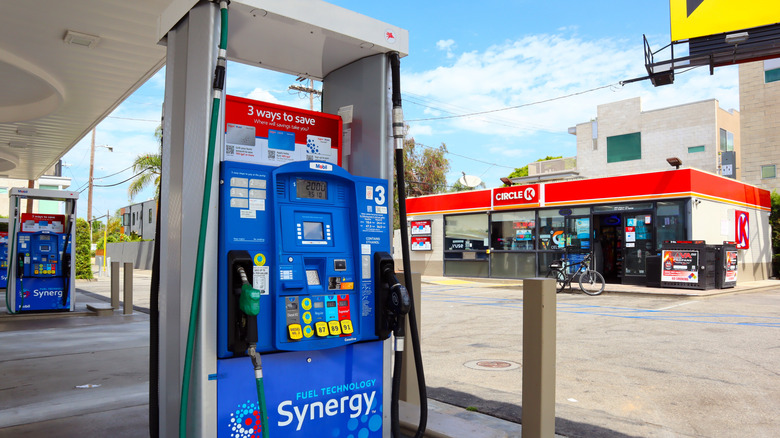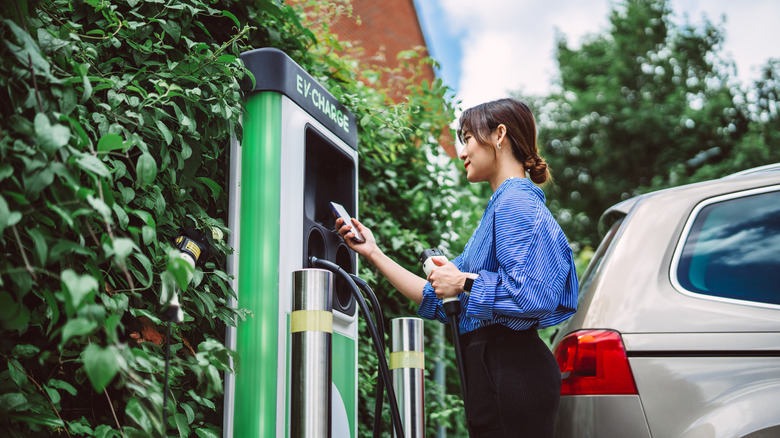Why California Has The Best Potential Average MPG In The US
With an average of 33.5 miles per gallon (mpg), California has the potential to be the most fuel-efficient state in the U.S. — its statewide average sitting well above the national average of 27.5 mpg. This achievement is driven by several factors, including widespread hybrid and electric vehicle (EV) adoption and strict emissions regulations.
The state's hybrid and EV share is an impressive 14.4%, nearly double the national average of 6.4%. Its higher number of fuel-efficient vehicles also boosts California's overall mpg: States with lower mpg averages — such as Wyoming (22.7 mpg) and North Dakota (22.6 mpg) — tend to favor gas-powered trucks and SUVs better suited for the rugged terrains.
What's more, California's fuel efficiency leadership is reinforced by stringent state policies. Unlike most states, California has the unique authority to set its own emissions standards, which are often more aggressive than federal requirements. This authority has pushed automakers to prioritize fuel efficiency, with the assumption that California's enormous market share will likely influence national production trends. Of course, gas prices also play a part in all this.
The impact of gas prices and vehicle preference
California consistently ranks among the states with the highest gas prices, averaging $4.88 per gallon in mid-2023. Higher fuel costs incentivize residents to choose more efficient vehicles, as the financial burden of gas-guzzling cars is significantly higher compared to states with lower fuel prices — When comparing the cost of a 250-mile drive across states, Californians pay around $39. While it's higher than the national average (around $37), it's also offset by their superior mpg.
Beyond these prices, California's high fuel efficiency is also influenced by residents' vehicle preferences. Compared to other states, California has one of the lowest percentages of pickup trucks, which are notorious for their lower mpg ratings (with rare exception). Pickups account for only 11.7% of vehicles in California, compared to 28% in other low-efficiency states. With their poorer fuel efficiency and larger gas tanks, it's no wonder Californians tend to avoid trucks: The cost to fill up alone would be enough to turn just about anyone away, to say nothing about the typical miles per gallon provided.
The role of policy and industry collaboration
California's fuel efficiency success is not just a result of consumer choice and economic incentives — It's also a product of its collaborative efforts with automakers. The state has formed lasting partnerships with major car manufacturers (such as Ford, BMW, Honda, and Volkswagen) to establish higher fuel efficiency and emissions standards for California. This agreement bypasses federal rollbacks on fuel economy standards and makes sure that new vehicles sold in the state continue to push mpg boundaries. Under this deal, California's fuel efficiency standards increase by about 3.7% annually.
This regulatory leadership extends beyond state borders. Because California represents a substantial portion of the U.S. auto market, its stringent standards influence nationwide vehicle production. Many automakers prefer to align their entire fleet with California's higher standards rather than produce separate models for different regulatory environments. Additionally, at least a dozen other states follow California's emissions and fuel efficiency guidelines, further amplifying its impact on national fuel economy trends.
California's policies also drive innovation in alternative fuel technologies. The state actively supports advancements in hydrogen fuel cell vehicles, plug-in hybrids, and fully electric cars through incentives and infrastructure investments. As the demand for sustainable transportation grows, California's progressive stance on fuel efficiency places it at the forefront of the clean energy transition. This commitment to innovation not only enhances its current mpg rankings but also sets a foundation for continuous improvement in vehicle efficiency nationwide.


